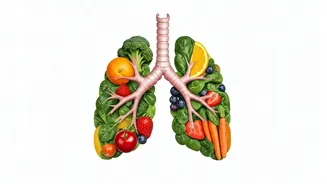Food vs. Lungs
The relationship between diet and respiratory health is intricate, with certain foods either supporting or undermining lung function. Choices related to nutrition
have a direct impact on the lungs, making it essential to understand which foods may be causing harm. Processed foods, for instance, are often filled with additives and preservatives that can trigger inflammation, a key issue that affects the lungs. Moreover, the consumption of high-sugar items and refined carbohydrates might contribute to increased mucus production, leading to breathing difficulties. Additionally, foods that are high in saturated and trans fats are associated with greater oxidative stress, which further harms lung tissue. Considering these elements, dietary habits greatly impact lung health.
Sugary Drinks and Lungs
Sugary beverages, including sodas and sweetened juices, are often high in refined sugars and are associated with a range of health issues, including problems related to lung function. These drinks can contribute to inflammation throughout the body, directly impacting the lungs. The excessive consumption of sugar can lead to weight gain, and this excess weight can put extra pressure on the lungs, making breathing harder. Moreover, these drinks lack essential nutrients and offer no benefit for respiratory well-being. Opting for water, herbal teas, or naturally flavored beverages can significantly improve lung health, as they offer hydration without the harmful effects of added sugars. Cutting back on sugary drinks helps decrease inflammation and improves overall respiratory function.
Processed Meats Harm
Processed meats, which include items like sausages, bacon, and deli meats, contain high levels of nitrates and nitrites. These are additives used to preserve the meat, and when consumed, they can lead to airway inflammation and constriction, causing breathing issues. Moreover, the high sodium content in processed meats can lead to water retention, which puts added stress on the lungs and complicates respiratory function. These foods are often cooked or preserved with methods that introduce harmful compounds. For maintaining good lung health, it's vital to limit the intake of processed meats. Consider fresh, lean sources of protein, such as chicken, fish, or plant-based proteins, to aid in preserving respiratory health. Making these shifts in your diet can contribute to healthier lungs and improved breathing.
Salty Foods' Impact
Excessive salt intake can lead to water retention, which in turn can lead to increased stress on the lungs, making it harder to breathe. Foods high in sodium are often found in processed and packaged items. Consuming too much salt can also elevate blood pressure, indirectly impacting lung function. Moreover, a diet rich in sodium may worsen symptoms for individuals with existing respiratory conditions, like asthma or COPD. Focusing on fresh, whole foods and limiting the consumption of processed and packaged foods will make it easier to manage salt intake and support respiratory well-being. Regular monitoring of your sodium intake, along with incorporating low-sodium alternatives, is key for protecting your lungs.
Refined Carbs' Role
Refined carbohydrates, found in white bread, pastries, and many snacks, can have a detrimental effect on lung health due to their quick impact on blood sugar levels. They can trigger inflammation, affecting the delicate tissues of the lungs. Moreover, refined carbs can lead to the production of more mucus, creating breathing difficulties and other related discomforts. These foods often lack essential nutrients and fiber, further diminishing their nutritional value. Choosing whole-grain options, such as brown rice and whole-wheat bread, instead of refined carbohydrates can assist in stabilizing blood sugar levels and decrease inflammation, supporting better respiratory function. Incorporating nutrient-rich foods is a powerful strategy to maintain healthier lungs and a healthier lifestyle.
Dairy's Potential Effects
Some individuals may find that dairy products contribute to an increase in mucus production, leading to a feeling of congestion in the chest and airways. This excess mucus can complicate breathing, especially for individuals who are already susceptible to respiratory challenges. Although not a universal reaction, some people experience aggravated symptoms. If dairy products appear to exacerbate your respiratory symptoms, consider substituting them with alternatives like almond milk or soy milk. This could reduce irritation and promote more comfortable breathing. Observing and understanding your body's response to dairy will help you to optimize your diet to support lung function and overall respiratory health.
Fried Foods and Lungs
Fried foods are often prepared in unhealthy oils that, when heated to high temperatures, can generate harmful compounds, which can potentially damage lung tissue and increase inflammation. These foods usually contain high levels of saturated and trans fats, which can also contribute to oxidative stress, negatively impacting lung function. The process of frying can also reduce the nutritional value of the food, offering little in terms of supporting respiratory health. Limiting fried foods and embracing healthier cooking methods, such as baking, grilling, or steaming, will help to reduce exposure to harmful substances and will promote better lung health. Being conscious about your cooking choices is vital to maintaining healthy lungs and promoting overall respiratory wellness.














